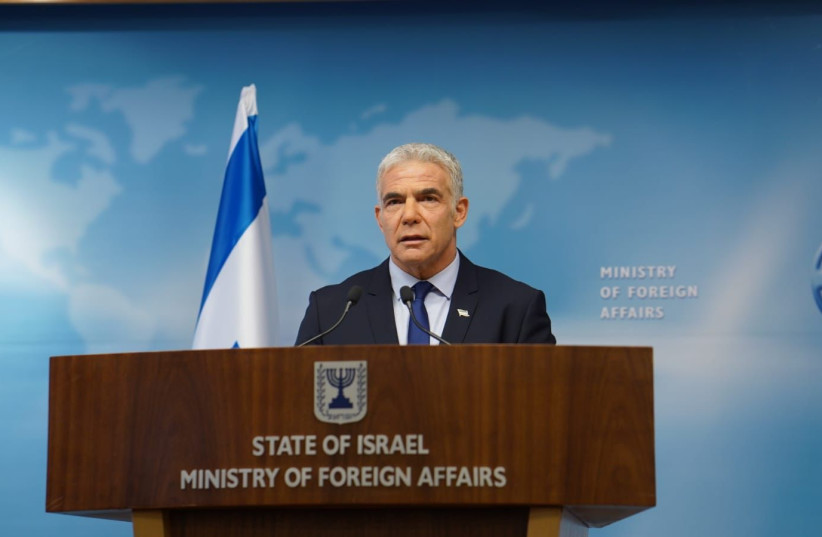Even in times of war, in wars that don’t even involve Israel, Israel seems to get the short end of the stick when it comes to media coverage and unjustified criticism on social media.
The Israeli response to the Russian invasion of Ukraine was admittedly slower than other countries – a response that makes sense when examined through the lens of a country that has Russia and Iran on its northern border in Syria.
Israel is in the challenging and precarious political situation of having good relations with both Ukraine and Russia, unlike Israel’s greatest ally, the United States. Despite that, Israel has taken tremendous measures not only to condemn Russia’s actions, but also to help the Ukrainian people.
Yet, Israel has been hounded and criticized in the international arena for not doing enough. In one example, NPR reported that Putin is beloved as an ally in Israel – an utterly ridiculous claim, especially given the fact that tens of thousands of Israelis marched in the streets protesting Putin’s invasion of Ukraine. It was in viral videos from the streets of Tel Aviv that Israelis with dual Russian citizenship burned their Russian passports in the streets. Public buildings have also lit up with the Ukrainian flag in solidarity.
At the government level, Israel, while initially hesitating to condemn Russia, did condemn Russia in the United Nations. Foreign Minister Yair Lapid also explicitly condemned Putin’s crimes, and going even further, has announced that Israel will comply with international sanctions against Russia, adding that Israel will not be a route to bypass said international sanctions.

Then comes the issue of humanitarian aid. Israel is already known for its exceptional humanitarian efforts globally, providing help for victims of disasters, whether man-made or otherwise. As rockets continued to pound Ukrainian cities, it was Israeli organizations like United Hatzalah who first set up emergency services, followed by IsrAid, MASHAV, the Israeli Foreign Ministry, Magen David Adom, and others. In the immediate aftermath of the war’s outbreak, it was the Israeli government that helped secure safe passage of not only Israeli citizens but also Arabs from enemy states like Lebanon, as well as a Palestinian from Gaza.
The Israeli government has announced massive initiatives, such as operation Shining Star, which will include the launch of a huge field hospital in Lviv to treat victims of Russia’s invasion. In addition, over 100 tons of humanitarian aid were shipped within the first few weeks and much more is set to be shipped this week for the installation of the field hospital. Similarly, El Al airlines has launched a major humanitarian aid operation, even partnering with passengers to help maximize space for more humanitarian aid. What other country is implementing such immense humanitarian efforts?
Moving on to the issue of refugees, Israel has faced criticism for alleged racism against non-Jewish Ukrainian refugees. While the Israeli government admitted in the first days that the initial refugee situation was unclear in regard to policy (and a mistake in translation of documents led to a handful of Ukrainians being denied entry), as of last Friday 12,610 Ukrainians had been admitted to Israel, with full medical care, and only 3,500 of them made aliyah (became citizens as a result of being Jewish).
This number of refugees accepted is far greater than other countries, such as the US and the UK, and even more than some of Ukraine’s neighboring countries. Furthermore, the Israeli policy is to admit any Ukrainian, Jewish or not, who has any relatives in the state of Israel.
Despite that, social media was filled with criticism of racist Israel due to inaccurate articles and content claiming Israel wasn’t providing healthcare or admitting Ukrainians into the country. This erroneous reporting from outlets like Middle East Eye is yet another example of how Israel can do no right in their eyes. Even when it admits far more refugees than any other country, it is disproportionately criticized in both the legacy media and new media.
While social media is an unchecked platform, legacy media platforms have an obligation to accurately report what’s going on. As Ukraine continues to be indiscriminately shelled, Israel continues to provide tremendous humanitarian care and continues to be criticized. The situation shines a bright light on the media’s continuing and deep obsession with Israel.
The writer is the CEO of Social Lite Creative LLC.
